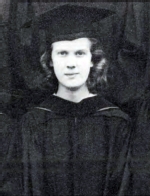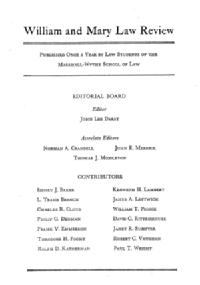Law School Celebrates 75 Years of Women
May 2012 marks the 75th anniversary of the first woman to graduate from our law school: Virginia Mister, in 1937. The Law School celebrated this important anniversary at its 2012 Dean's Council dinner.
Virginia Mister, who grew up on the Eastern Shore of Virginia, enrolled at the Law School in 1935, having just completed her undergraduate studies at the College of William & Mary. As an undergraduate, Mister was deeply involved in the life of the College. She played on William & Mary's women's basketball team, sang in the glee club, and was president of the Kappa Kappa Gamma sorority.
Virginia Mister also wanted to be a lawyer. A few months after completing her undergraduate degree, she joined the Marshall-Wythe Class of 1937 - which had about five students. In those days, a student could complete both an undergraduate degree and a law degree at William & Mary in six years.
Mister later recalled her law school experience: "I was a bit awed by being the only woman. But Dean [Theodore] Cox was so charming and gracious, I soon forgot about being awed and frightened. There was no discrimination from faculty or students." Two years later, she graduated - the first woman to graduate from our law school.
What was it like for women graduating from law school in the first half of the 20th century - a time when only a tiny fraction of the profession were women? Here is how one historian has described it:
Women took whatever they could find, often jobs as stenographers or librarians in law firms, or went into practice with their husbands or fathers.... Women who got married emphasized how important it was to find the right husband - one of the few men who understood and supported his wife's desire to have a career.... The Depression made everything worse. Women were made to feel guilty if they applied for positions that could be held by a man with a family to support; it was even suggested that legislation be passed forbidding married women from working if their husbands were employed.
Cynthia Bowman, Women in the Legal Profession From the 1920s to the 1970s, 61 MAINE L. REV. 1, 4 (2009).
So what happened to Virginia Mister after her graduation from Marshall-Wythe?
She passed the Virginia bar exam, and set her sights on practicing law in Norfolk. But she needed to find a way to get her foot in the door in a profession that was largely closed to women.
Upon hearing that a prominent Norfolk attorney, James G. Martin, was losing his secretary, Mister promptly took and completed a stenography course and applied for the secretarial job at his firm.
Martin hired her, and in short order moved for her admission to the bar of Virginia. She thereby became only the second woman in Norfolk to become a member of the bar and among the very first women in Virginia. Our knowledge of the exact role that Mister played in Martin's firm is not clear, but she did later comment that she preferred research to court work.
Mister was a true citizen lawyer. During World War II, she led a broad array of civic efforts in Norfolk in support of the war effort.
After the war, Mister moved to New York City to work at the newly established United Nations. As Mister put it, she had worked hard for the war effort, and now wanted to work for the peace effort.
She would work for more than 25 years at the United Nations, serving as head of the Legal, Political and Security Council Affairs Library at the United Nations. She returned to Virginia after her retirement.
 Mister would soon be followed by other women at Marshall-Wythe. Three years after Mister's graduation, Laetitia Armistead graduated valedictorian of the eight-member Class of 1940.
Mister would soon be followed by other women at Marshall-Wythe. Three years after Mister's graduation, Laetitia Armistead graduated valedictorian of the eight-member Class of 1940.
Historians of women in legal education in the first half of the 20th century have noted that those few women enrolled in law schools tended to perform extremely well.
Between 1937 and 1970, a stretch of 33 years, only 27 women graduated from our law school. This was a time in Virginia when women in law practice - and in law schools - were still uncommon.
But there were some significant moments for the women at Marshall-Wythe during those years. During the 1957-58 academic year, the William and Mary Law Review began publication, replacing the earlier William and Mary Review of Virginia Law. The Law Review's first editor-in-chief was a woman named John Lee Darst.
 During the early 1970s, things began to change for women at our law school. Of those who enrolled in 1970 as members of the Class of 1973, only 4 percent were women.
During the early 1970s, things began to change for women at our law school. Of those who enrolled in 1970 as members of the Class of 1973, only 4 percent were women.
But three years later, women comprised 17 percent of the new students who arrived in 1973 as part of the Class of 1976. One year later, in 1974, a group of women students founded the Law School's first women's organization: the Mary and William Society.
By the fall of 1977, the number of women law students continued to increase, as 28 percent of the students who enrolled in the Class of 1980 were women. In the fall of 1981, 40 percent of the newly arrived Class of 1984 were women.
Finally, in 1989, Marshall-Wythe enrolled a class that for the first time in our history was majority female - as 52 percent of the Class of 1992 were women. Ever since, our law student population has been roughly half women and half men.
The arrival of women faculty came a little later. In 1979, we hired our first full-time, tenure-track female faculty members: Lynda Butler, who remains our most senior faculty member, and Ingrid Hillinger, who had graduated from our law school in 1976 and who now teaches at Boston College Law School.
In 1983, we hired our third female faculty member, Glenn George, who is now at the University of North Carolina. She was followed by Jayne Barnard, who joined our faculty in 1985, and then Susan Grover, Linda Malone, and Margaret Spencer, who arrived in 1988.
Today, 40 percent of our full-time faculty are women.
Our women students have excelled at Marshall-Wythe. Here are a few examples of this excellence.
Each year, the Law School confers a special prize, now called the I'Anson Prize, on one or two students who, in the judgment of the faculty, show the greatest professional promise. Since 1980, there have been 42 winners of this prize. Exactly half of those winners have been women.
Since 1988, we have awarded 42 Kaufman & Canoles prizes to those of our students who have shown the greatest accomplishment in legal writing. Of that group of 42 students, 24 have been women.
Since 1994, we have awarded 23 Thurgood Marshall awards to graduating students who have best demonstrated the service ethic of Thurgood Marshall. Of those 23 students, 14 have been women.
The William and Mary Law Review has recently flourished under the leadership of women. Of the past 11 editors-in-chief of the Law Review, seven have been women, including this year's editor-in-chief, Merideth Snow.
This year, a group of women law students organized our newest organization, the Initiative for Gender, Sexuality, and the Law, which promises to provide the Law School with a serious examination of legal issues involving gender and sexuality. This new student organization, under the leadership of two members of the Class of 2013, Jules Irvin-Rooney and Lyndsay Maier, held its first major conference in October 2012. Their keynote speaker was Sybil Shainwald, who graduated from the College of William & Mary in 1948 and became one of the most significant attorneys in the nation defending women's health interests.
Virginia Mister is no longer with us; she died in 2003. But I know she would be very proud to see the ways in which her law school has developed, and the significant leadership exercised by our women faculty, students, and alumni.
And Virginia Mister will live on in our memory. A group of alumnae have devised an appropriate way to honor her legacy: they are raising money to establish a Virginia Mister Scholarship, thereby ensuring that Mister's pathbreaking role in our history will be remembered for generations to come.
In 2012, a group of alumnae who are current and former partners in major law firms chose to recognize Virginia Mister by creating a scholarship bearing her name. If you would like to join in this effort—the Virginia Mister Scholarship Endowment—please contact Katey Howerton, Associate Dean for Advancement at (757) 221-1394 or kmhowe@wm.edu.
Or visit our giving page and search for the Virginia Mister Scholarship Endowment (Law) (3784).


